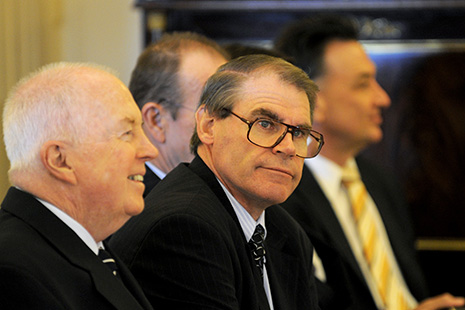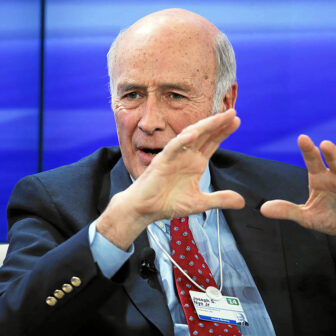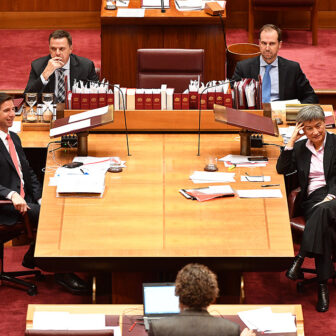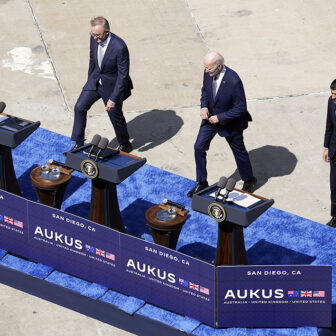SPARE A THOUGHT for John Faulkner. He was quietly beavering away as special minister of state, making steady progress in pushing for more open government, campaign finance reform, and tougher rules for politicians and senior officials who become lobbyists. Then he woke up one morning in June to find that Joel Fitzgibbon was out the door as defence minister and he had the job. Suddenly, he was implementing policies he’d had no say in formulating, and handling the fall-out when things went wrong.
Faulkner may not see it this way, but the new defence white paper is likely to cause much grief down the track. Apart from committing staggering sums to ill-conceived weapons programs, the white paper can be seen as reflecting a partial return to the discredited “forward defence” doctrine abandoned in the 1960s. But Faulkner also inherited decisions that are creating more immediate trouble. Most stem from the failure of previous ministers to say no to senior Australian Defence Force officers who have gained far too much say in the defence department over the past decade.
Late last month the High Court ruled that the Military Justice Tribunal is unconstitutional. Before the tribunal was established, a Senate committee warned that this would be the entirely predictable outcome if it were not independent of the military. But the Howard government ignored the committee and surrendered to the ADF’s demands that it exercise control. Now Faulkner has to pick up the pieces and establish a new military court that conforms to the constitution.
Faulkner also inherited his own government’s expanded intervention in the civil war in Afghanistan. Although the aim is to prevent al Qaeda from regaining sanctuaries in the country, the main effect of the continuing presence of western troops has been to prop up a deeply corrupt and incompetent government that includes vicious drug lords and treats women almost as appallingly as the Taliban insurgents had. The new US commander, General Stanley McChrystal, has just reported to President Obama that progress is proving difficult to achieve. His revised tactics include urging western troops to stop killing so many civilians.
In Australia’s case, the problem stems from aggressive night operations in which special operations troops enter houses, often on the basis of dubious tip-offs, to kill or capture suspected members of the Taliban. On 12 February one group of Australians killed five children. SBS’s Dateline program later interviewed survivors who said that the Australians had not come under attack before they threw grenades into houses where children were sleeping. The owner of one of the houses told SBS that the Australians later returned to apologise that “they must have received a false report.”
While the deaths continue, they will remain a powerful recruiting tool for the Taliban and a potential motivation for future acts of terrorism. No outside investigation into these operations ever takes place, and the ADF’s internal investigations have always exonerated the forces involved. Faulkner assured parliament on 12 August that the government takes the issue of civilian casualties extremely seriously. More such assurances can be expected in future. But he has not subjected the ADF to the sort of outside scrutiny that is now routine when police kill innocent people in Australia.
The problems of Defence “exceptionalism” are not confined to present-day issues of life and death. Two recent examples show the difficulties that arise when the ADF is let loose on the past. In her capacity as acting prime minister, Julia Gillard announced last year that a retired judge, Terence Cole, would conduct a commission of inquiry for the ADF into the sinking of HMAS Sydney by a German raider off the West Australian coast in 1941. Gillard said the inquiry would “try for all time to solve this mystery [of] what happened to the Sydney.” But there was no mystery. The Sydney was sunk by enemy action, as sometimes occurs during a war.
The astonishing aspect of Gillard’s willing embrace of Cole is that she was speaking as education minister. She should have refused to endorse the ADF’s legalistic – and ridiculously expensive – approach to how history should be researched and written. The tragic loss had already been exhaustively examined by competent historians and in a high-quality parliamentary committee report in 1999. More recently, underwater images of the wreckage had provided additional material for ongoing work by naval historians and other specialists.
Rarely is good history written by a cumbersome commission examining a sixty-six-year-old event about which no one is trying to hide anything. Commissions of inquiry can sometimes use their powers of compulsion to throw light on present-day events when a cover-up is occurring. But this was not relevant to the inquiry into the Sydney, in which no fewer than eight naval officers acted as counsel assisting Cole. A public affairs officer even gave the defence department a “hot issues brief” at the conclusion of each day’s hearings. Unsurprisingly, no hot issues arose. When Cole’s report was released on 12 August it contained nothing new of any significance.
Yet the report cost $6.7 million, including $3 million for legal fees and $918,600 for Cole’s salary. And those millions do not include the cost of extensive assistance received from several departments and diplomatic posts. Even so, $6.7 million would have been enough to let dozens of proper historians work on a wide range of topics. But Gillard was busy squeezing spending on universities at the same time as she was enthusing about how Cole would improve “our understanding of ourselves.” He did no such thing and no one who knew him expected for a moment that he would.
The Howard government had earlier paid Cole $1.05 million to head a royal commission into malpractices in the building industry. Although it cost $66 million, no successful prosecutions ensued. Howard also paid Cole $850,000 to head the $10 million enquiry into the AWB wheat exports scandal. The federal police last week announced that no one would face charges.
Fortunately for Faulkner, nothing more will be heard of the folly of getting Cole to rehash what happened to the Sydney. The same can’t be said for the government’s contentious decision last year to go ahead with proposals to exhume the fragmentary remains of Australian soldiers killed at Fromelles in France in 1916. Up to 300 sets of remains of British and Australian soldiers are co-mingled in a series of burial pits. The Germans sent identification tags back to Australia during the war, but the exact location of the burial site was not established until a couple of years ago.
The simplest option – and the most respectful, in the view of many of the correspondents to newspapers – would have been to erect a commemorative plaque at the site. The French owner of the land was amenable, but the lure of DNA testing proved irresistible. The government agreed with army proposals to dig up the remains, search for suitable tissue, apply DNA tests where possible, and then bury them in fresh graves. The idea was backed by a small number of distant relatives who apparently felt they would obtain “closure” by opening the graves.
Rather than let them rest in peace, the government is paying $6.2 million for a British group of forensic archaeologists to dig up the remains in an effort to establish their identity. Recovering suitable tissue is not an easy task, and most of those killed were young men with no immediate descendants who can provide a close DNA match. The minister for defence personnel, Greg Combet, said on 10 August that full-scale DNA testing would proceed. But, he cautioned, “The delicate condition of the remains, the soil surrounding them and high water table has made the extraction of DNA difficult. Therefore it is also important to note that the chance of identification of each soldier still remains quite low.”
The process could take as long as five years. But work has already begun on constructing a new cemetery where the remains of the Australian and British soldiers are supposed to be reburied in individual graves. The reality is that most will not be accurately identified and will be reburied in groups. In these cases, the government will have disturbed the dead for no useful purpose. Sensibly, Faulkner is leaving this issue to Combet. •




